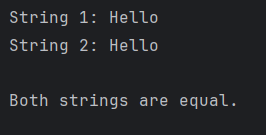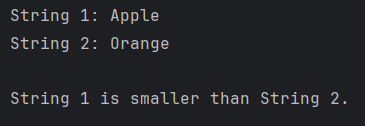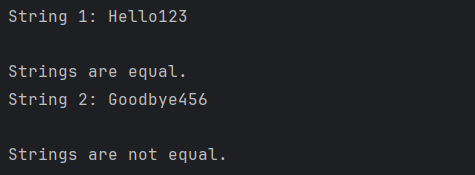Comparing Strings in C++

In programming, various data types are managed, and strings are crucial. Strings, extensively used in coding, often require comparison during program compilation.
String comparison is a universal practice, but programming languages provide diverse methods and techniques.
Explore three string comparison methods in C++ with this guide.
Jump To...
3 Methods to Compare Strings in C++
We will illustrate string comparison in C++ by employing the following methods.
Utilizing the ‘strcmp()’ function created for string comparisons.
The built-in ‘compare()’ function is designed explicitly to compare strings.
The third one is relational operators in C++ like ‘==’ and ‘!=’.
1. Utilizing the strcmp() Function in C++
C++ provides dedicated functions for comparing strings, such as the strcmp() function from the C library. This function is pivotal for lexicographically comparing two strings, evaluating characters based on their ASCII values in dictionary order.

Syntax of strcmp():
The strcmp() function accepts char arrays as input parameters, representing C-style strings. It is case-sensitive, comparing both the first and second strings.
The function returns 0, a negative, or a positive value.
int strcmp(const char *str1, const char *str2);
Return values of strcmp() function:
This function returns:
0 when both strings are identical.
< 0 (negative) when the string 1 is lexicographically less than the string 2.
> 0 (positive) if the string 1 is lexicographically greater than the string 2.
Example-1:
In the upcoming C++ code, start by including the header file at the beginning, such as ‘<cstring>’. Then, define the char array individually and assign a string to each. Additionally, in C++, the asterisk ‘*’ accompanying array names signifies a pointer.
#include<iostream>
using namespace std;
#include<cstring>
int main() {
const char *str1 = "Apple";
const char *str2 = "Orange";
cout << "String 1: ";
cout << str1 << endl;
cout << "String 2: ";
cout << str2 << "\n";
if(strcmp(str1,str2)==0){
cout << "\nBoth strings are equal." << endl;
} else
cout << "\nThe strings are not equal." << endl;
}
Output:
Therefore, the expression strcmp(str1, str2) compares two different strings, resulting in a non-zero value, so the results are as follows:
String 1: Apple
String 2: Orange
The strings are not equal.

Example-2:
In this snippet of code, the initial and secondary strings are pre defined, just as they were previously set.
#include<iostream>
#include<cstring>
using namespace std;
int main() {
const char *str1 = "Hello";
const char *str2 = "Hello";
cout << "String 1: ";
cout << str1 << endl;
cout << "String 2: ";
cout << str2 << "\n";
if(strcmp(str1,str2)==0)
printf("\nBoth strings are equal.");
else
printf("\nThe strings are not equal.");
}
Output:
In the above code both groups of characters in the strings have the exact same ASCII values and the strcmp(str1, str2) function gives back 0. This zero represents that “Hello” word in both strings is same.
Additionally, if both arrays contain a null character when compared, they will also result in the same output.
String 1: Hello
String 2: Hello
Both strings are equal.

2. Utilizing the compare() Function in C++
C++ offers the compare() function for comparing two strings.

Syntax of compare():
The compare() function is defined with the following prototype:
int compare(const string& string_name) const;
Return values of compare():
The return type of this library function is an integer.
0 if both strings are identical.
(negative value) – < 0, if the string 1 is alphabetically before the string 2 in the dictionary order.
(positive value) – > 0, if the string 1 is lexicographically greater than the string 1.
Example-1:
The following code illustrates string comparison using the compare() function.
#include<iostream>
#include<string>
using namespace std;
int main() {
string str1("Apple");
string str2("Orange");
cout << "String 1: ";
cout << str1 << endl;
cout << "String 2: ";
cout << str2 << "\n";
int result = str1.compare(str2);
if (result == 0)
cout << "\nBoth strings are equal.";
cout << "\n";
else if (result < 0)
cout << "\nString 1 is smaller than String 2." << endl;
else
cout << "\nString 1 is greater than String 2." << endl;
}
Output:
In this scenario, the compare() function returns a negative value because, in string comparison, string 2 is greater than string 1.
String 1: Apple
String 2: Orange
String 1 is smaller than String 2.

Example-2:
Incorporate integer values within strings in the following code to observe potential return values when matching cases in this scenario.
#include<iostream>
#include<string>
using namespace std;
int main() {
string str1("Hello123");
string str2("Hello123");
string str3("Goodbye456");
cout << "String 1: ";
cout << str1 << "\n";
if(str1.compare(str2)==0)
cout << "\nStrings are equal." << "\n";
else
cout << "\nStrings are not equal." << endl;
cout << "String 2: ";
cout << str3 << "\n";
if(str3.compare(str1)==0)
cout << "\nStrings are equal." << "\n";
else
cout << "\nStrings are not equal." << endl;
}
Output:
The results indicate equality in all characters during this string comparison, and the numeric values have no impact when included in a string.
String 1: Hello123
Strings are equal.
String 2: Goodbye456
Strings are not equal.

3. Relational Operators (==, =!) in C++
In C++, relational operators like == (double equals) and != (not equals) prove invaluable for comparing strings.

Syntax of the 'Double Equals' Relational Operator:
To verify whether two strings are equal: string1 == string2
Example-1:
Explore an example where user input strings are obtained using a while loop.
#include<iostream>
#include<string>
using namespace std;
int main(){
string str1;
string str2;
int count=1;
while(count<3){
if(count==1){
cout << "Enter String 1: ";
cin >> str1;
} else {
cout << "Enter String 2: ";
cin >> str2;
}
count++;
}
if (str2==str1)
cout << "Strings are equal" << "\n";
else
cout << "Strings are not equal" << "\n";
}
Input/Output:
In this situation, the strings entered by the user are ‘hello’ and ‘apple,’ in that order. The ‘==’ operator compares the two strings and returns a flag indicating that both strings are different.
Enter String 1:hello
Enter String 2:apple
Strings are not equal

Syntax of 'Not Equals' Relational Operator:
To check if two strings are not equal: string1 != string2
Example-2:
In this scenario, employ the not equals operator ‘!=’ and prompt the user for input, expecting a negative number.
#include<iostream>
#include<string>
using namespace std;
int main(){
string str1;
string str2;
cout << "Enter String 1: ";
cin >> str1;
cout << "Enter String 2: ";
cin >> str2;
if (str1 != str2)
cout << "Strings are not equal" << "\n";
else
cout << "Strings are equal" << "\n";
}
Input/Output:
Match one string against another, yielding the following results:
Enter String 1:-1
Enter String 2:-1
Strings are equal

In the earlier mentioned example, the comparison operator assesses two strings from their first characters until both strings finish, determining that they are equal.
Conclusion
Ultimately, we’ve investigated three different approaches for string comparison in C++. One approach involves using strcmp(), which assesses strings by their individual characters. Another way is to use compare() function, offering flexibility for specific comparisons. Also, C++ has relational operators ‘==’ & ‘!=’ signs for simple string checks. Programming professionals can pick any of these methods according to their requirements for making string comparisons more efficient and accurate.




